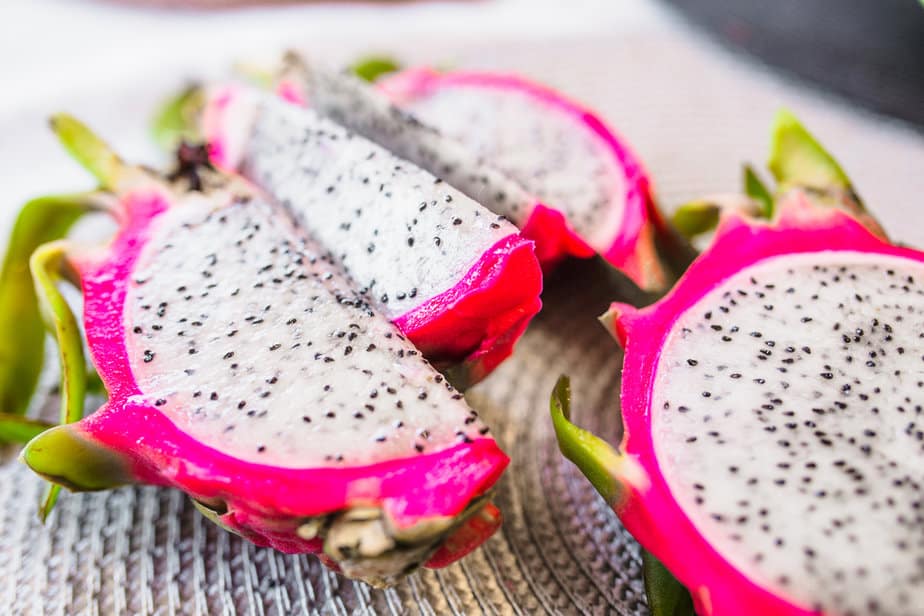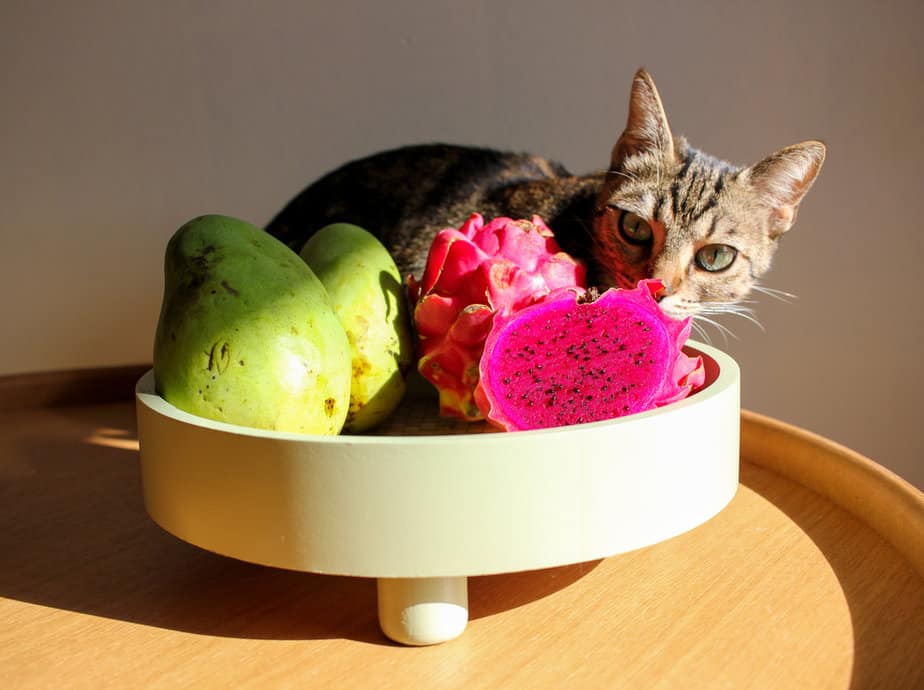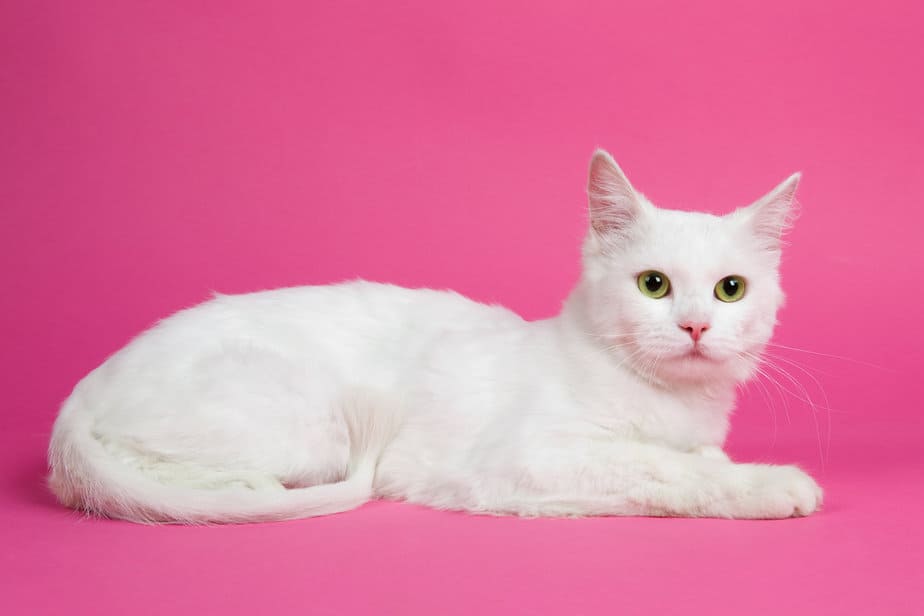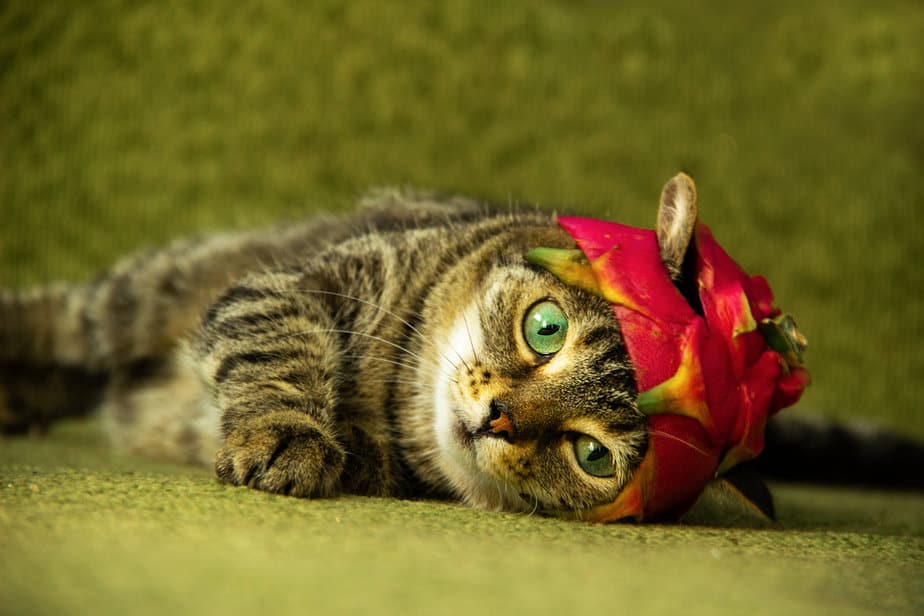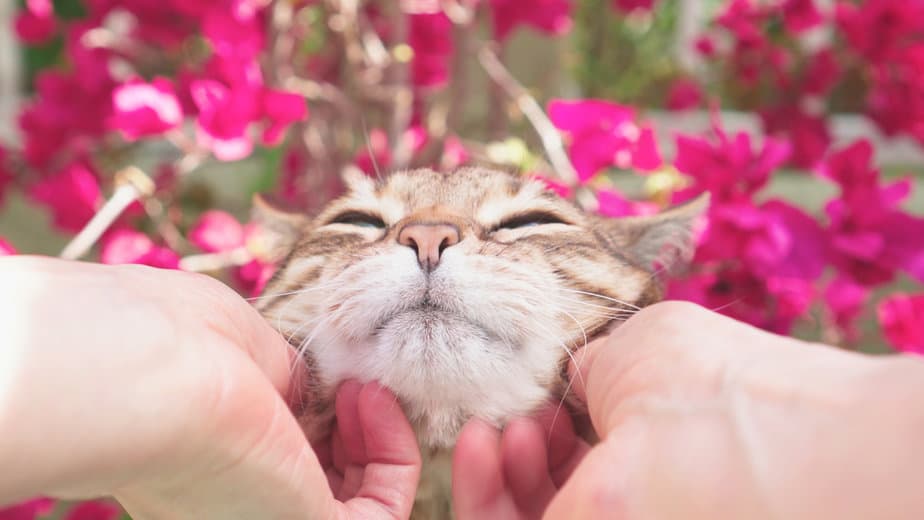📖 Table of Content:
- What is dragon fruit?
- What are the nutritional and health benefits of dragon fruit?
- Can cats eat dragon fruit safely?
- How to safely feed dragon fruit to your cat?
- What to do when your cat eats too much dragon fruit?
- Can kittens eat dragon fruit?
- Can cats eat other fruits?
- Cats can eat dragon fruit, but…
We’ve all been there: knocking down everything in your path while trying to get to the kitchen in the middle of the night for a little somethin’ somethin’. Let’s be honest, late-night snacking isn’t anything new for you or your furry friend. But you’re into fruits, and can cats eat dragon fruit with you?
One thing’s for sure, your cat doesn’t seem weirded out by this odd-looking, straight-out-of-a-Dr.-Seuss-book, psychedelic artichoke. She makes the “O” face whenever she sees you munching on a chunk. She gives you the look and starts meowing and purring to let you know she’s plotting her next move.
Sometimes she even climbs on the kitchen counter. She chases it around while you’re preparing the ingredients for your Instagram-worthy acai bowl. But you’re not so keen on letting her take a bite – I mean, you don’t want her to spend the rest of the day in and out of the litter box.
You’re pretty sure you’ve never seen Garfield scoff down a fruit salad. But you’ve seen him devour an entire thing of lasagna in one sitting. Your feline friend doesn’t seem to have any vegan or plant-based tendencies. So, you’re taking some time out of your day to look up “can cats eat dragon fruit?”.
And we’re coming through with the answers you’re looking for! According to our friends over at the American Society for the Prevention of Cruelty to Animals (ASPCA), dragon fruit gets a passing grade. This tropical fruit brings numerous nutritional and health benefits to the table, and who doesn’t like that!?
But, before you and your purrincess head out to Starbucks to get yourselves some Mango Dragonfruit Refreshers, you might want to consider a couple of stumbling blocks. Let’s start from the beginning, shall we?
What is dragon fruit?
Where do we even start!? Dragon fruit, strawberry pear, pitaya, or even pitahaya (pick a favorite name, they’re all equally adorable) looks like something straight out of a children’s fairy tale book.
One of the most common types of this tropical fruit is pink with green scales (hence the “dragon” part of the name) on the outside and white flesh with black seeds on the inside. Some of the other variants you might come across are pink with pink flesh, pink with purple flesh, and yellow with white flesh.
What does it taste like!? An incredibly sweet combination of kiwi and pear would be the best way to describe the taste of this summery treat. Humans around the world can’t seem to get enough of dragon fruit. They put it in pretty much everything, from smoothies and acai bowls to salads and desserts.
And, this tropical fruit comes with heaps of nutritional and health benefits. A couple of bites can help improve the quality of your and your feline friend’s lives. So, grab your pen and paper and start jotting down everything you need to know about dragon fruit before you go for your next grocery run.
What are the nutritional and health benefits of dragon fruit?
When determining whether cats can eat dragon fruit, it’s important to keep in mind that this tropical fruit does bring a lot of benefits. It’s packed with fiber, vitamins, minerals, antioxidants, and numerous essential nutrients.
But, it’s just as important to understand that these nutrients might not have the same effect on your precious purrincess. She’s much more likely to thrive on carefully crafted cat food and cat treats. That said, it won’t hurt to surprise her with an occasional dragon fruit nibble.
So, what exactly does dragon fruit bring to the table? First things first, this tropical fruit contains high levels of fiber which can be beneficial for both your and your furry friend. Fiber can help with digestive problems, provide bulk to help food move through your digestive tract, and improve metabolic function.
Dragon fruit also contains a bunch of vitamins, minerals, and antioxidants. The most prominent of the bunch, vitamin C, helps to boost the immune system and enables the body to fight against infections and inflammation.
But here’s what we mean when we say your feline friend might not get the same benefits from dragon fruit as you do.
Felines already synthesize vitamin C within their liver. So, your furball doesn’t necessarily need to acquire this vitamin from other sources (unless she’s already battling liver disease, but that’s a topic for another day).
Let’s not forget about iron, magnesium, lycopene, and carotenoids that make up for everything else, though! These nutrients can reduce the risk of cancer, improve heart health, and promote the growth of healthy gut bacteria.
But… There’s always a but when it comes to feeding your cat anything that isn’t a part of her regular diet. Who’s to say cats can eat dragon fruit with zero repercussions?
Can cats eat dragon fruit safely?
Don’t worry, you’re not the only one to look up whether or not cats can eat dragon fruit. Our furry friends can’t seem to get over the fact that this tropical treat doesn’t fall under the category of things they’re supposed to consume on a regular basis.
You see, cats are obligate carnivores. They pretty much have to consume a bunch of meat, animal protein, and animal-sourced nutrients to survive. Fruits and veggies might be great for you, but they’re not necessarily great for your kitto in trying to lead a happy and healthy life.
What do we mean by that!? Well, you shouldn’t be surprised if your furry friend spends the rest of the day with symptoms of stomachache, diarrhea, and vomiting after she accidentally scoffs down an entire bowl of dragon fruit.
Her digestive system doesn’t contain the enzymes necessary to break down and process fructose (which can be found in dragon fruit and other fruits). She can’t get the same benefits from dragon fruit that humans do. There aren’t enough reasons for her to consume this tropical fruit regularly.
If you had to take your cat to McDonald’s, a hundred bucks says she’d forego the Tropical Pie with Sundae for the Chicken McNuggets. Trust me, she would rather munch on meaty morsels than bore herself to death with tasteless dragon fruit. How’s that possible?
Cats are completely sweet blind! They can’t taste sweet things no matter how much they’d like to. They’re genetically predisposed to spend every single one of their nine lives on a Keto diet. So, while cats can eat dragon fruit, that doesn’t mean that they should.
How to safely feed dragon fruit to your cat?
Quit dragon your feet and read everything you need to know about feeding dragon fruit to your cat without getting her in trouble. Poor pun aside, there’s hardly anything better than seeing your cat happy and healthy, so what are you waiting for!?
First things first, don’t forget to clean your dragon fruit. You don’t want your precious purrincess munching on whatever bacteria, parasites, and viruses might be lurking under those scales! Secondly, cut the dragon fruit in half and scoop out the flesh and make sure you don’t scoop out any of the bitter parts.
Cut the flesh into smaller bites and offer them to your cat on their own or alongside other paw-licking foods. And voila, you have the purrfect Sunday snack for you AND your furry friend!
What to do when your cat eats too much dragon fruit?
We already know that cats can eat dragon fruit as an occasional treat. But, can they eat dragon fruit as a regular part of their diet? Can they eat a bunch of dragon fruit in one sitting? Of course not, and it’s your responsibility to make sure your furkid doesn’t overindulge in this tropical treat.
Sure, a couple of bites of dragon fruit every now and then shouldn’t cause any adverse reactions. But, we can’t say the same thing about scoffing down an entire bowl (or even worse, downing the entire Mango Dragonfruit Starbucks Refresher).
So, what do you do when you have a greedy little gremlin on your hands? Don’t worry, she would have to consume A LOT of dragon fruit to experience severe digestive symptoms such as stomach upset, diarrhea, and vomiting.
But, you can always contact your vet and check whether the two of you should pay him a visit. On the off chance that she experiences symptoms of a dragon fruit allergy, you might have to take her to the nearest emergency animal center.
She should feel much better as soon as she gets most of the fruit out of her system.
Can kittens eat dragon fruit?
A bit of dragon fruit here and there shouldn’t harm your kitten, but it’s better to err on the side of caution.
You see, kittens ideally shouldn’t consume anything other than their mother’s milk. Their digestive systems aren’t fully developed and equipped with the enzymes necessary to break down most foods.
Once your kitten gets a bit bigger, you can consult with your vet and surprise her with a couple of bites of dragon fruit every now and then. But no, as a general rule, kittens can’t eat dragon fruit.
Can cats eat other fruits?
The answer to this question isn’t a simple yes or no.
Cats don’t necessarily need any fruits and veggies in their diet. But, who’s to say that they can benefit from those vitamins, minerals, and antioxidants? And what about the importance of fiber in their digestive tract?
Just like with any other human foods, you have to keep an eye out for harmful compounds, oils, and toxins that can be found in particular fruits. With that in mind, cats can’t and shouldn’t eat lemons, limes, oranges, grapes, and cherries.
These fruits contain different compounds that can cause harm to your cat’s health. On the other hand, there’s pretty much nothing stopping you from feeding your cat an occasional peach, mango, papaya, raspberry, blueberry, strawberry, banana, honeydew, cantaloupe, watermelon… The list goes on and on!
Cats can eat dragon fruit, but…
Don’t forget to provide your furry friend with a balanced diet of tailored cat food (and the occasional cat treat) before feeding her a bit of dragon fruit.
The famous “too much of anything can make you sick” policy applies to your furry friend, too. Consult with your vet before making any significant changes to your cat’s diet. But, other than that, feel free to surprise your kitto with a purrfect Sunday snack.
You may be interested: Can Cats Eat Guava? Can You Serve This Exotic Fruit To Your Furbaby?

